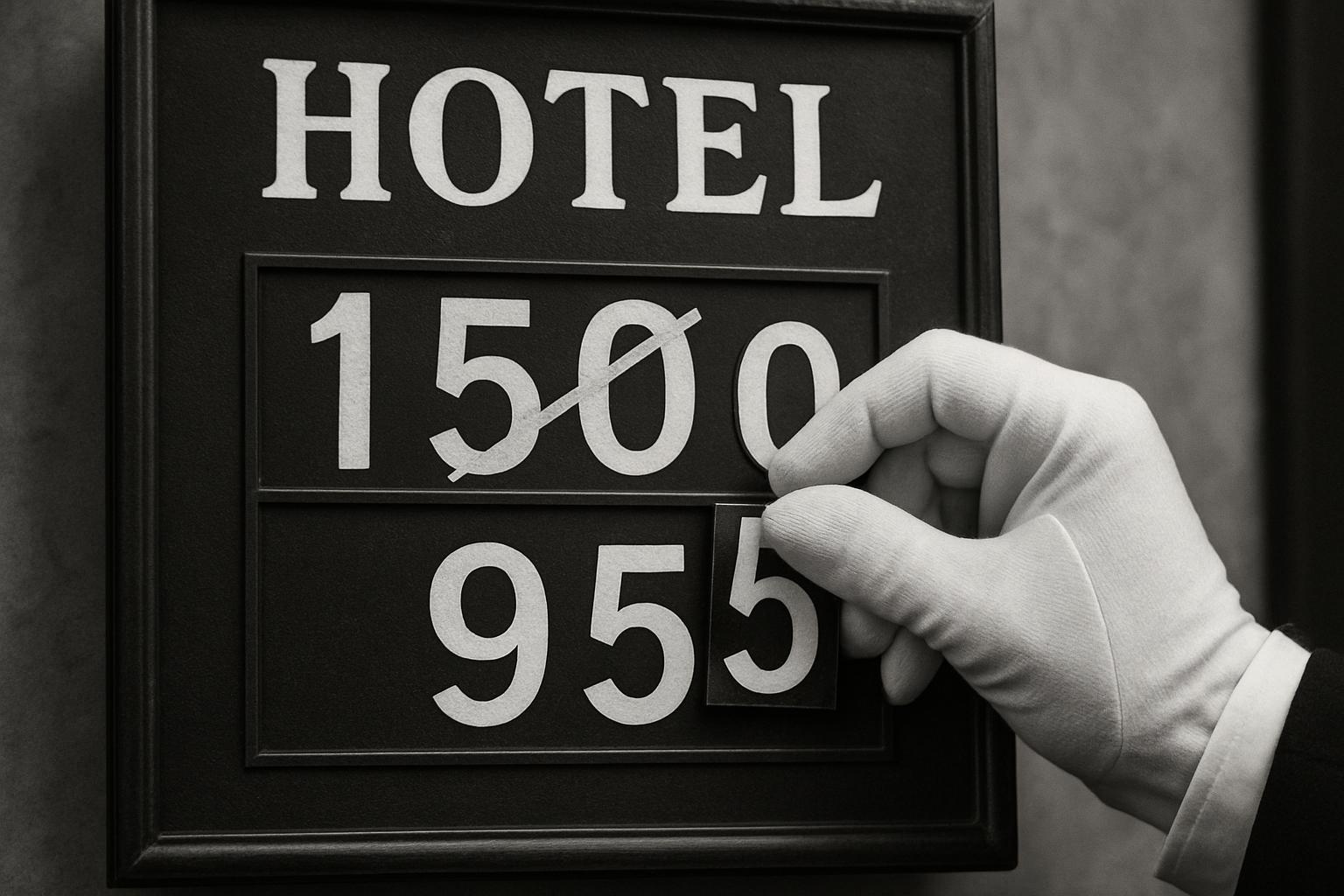London’s newest and established five-star hotels are quietly cutting headline room rates that hit four figures during the post-pandemic boom — Raffles at The OWO, The Peninsula and The Emory have shown entry prices falling into the high-£700s–£900s on selected dates. Industry sources say a heavy pipeline of new high-end openings and softer demand has prompted tactical yield management and targeted promotions, signalling a market correction rather than a wholesale collapse in luxury pricing.
London’s top hotels are quietly trimming the headline room rates that shocked travellers during the post‑pandemic “revenge travel” boom, making stays that once felt out of reach markedly more bookable. According to reporting from Travel and Tour World and subsequent industry checks, properties that opened in 2023 and 2024 — which initially advertised rooms well into four figures — are now offering many dates below those entry prices: Raffles at The OWO has moved Classic‑room availability from roughly £1,165 at launch to rates seen around £789 on selected dates, The Peninsula London’s opening packages that referenced about £1,300 a night are now searchable nearer £900 on later dates, and The Emory in Knightsbridge — billed at around £1,620 at debut — has been visible in inventory from under £1,000. Established names have followed suit: The Dorchester is advertising promotional “plan in advance” rooms from about £750, illustrating how both newcomers and legacy hotels are revising their offer sets.
The recalibration is not random price cutting but a market correction rooted in changing supply and demand. Market reporting and republished analyses note that average nightly rates at five‑star hotels in London are down substantially compared with peaks in 2024 — with some estimates suggesting falls in the order of 20–50% for comparable dates — as operators reconcile ambitious opening pricing with softer demand and mounting new supply. Hotels that tested very high introductory rates last year are now running targeted discounts and packages to maintain occupancy, signalling a shift from headline experimentation to more tactical yield management.
That growing supply is central to the story. Industry coverage has traced a heavy pipeline of high‑end openings — including Rosewood’s Chancery project in Mayfair and a Six Senses flagship anchoring Bayswater’s regeneration — and analysts warn the volume of new rooms risks outpacing demand in the near term. The Financial Times and other reports quote hospitality figures who say the scale and timing of these launches could create a short‑term oversupply that will continue to put downward pressure on headline rates as operators fight for market share.
Economic context intensifies the squeeze. With global economic uncertainty moderating leisure and business travel behaviours, even affluent visitors are reportedly more value‑conscious; hotels that priced aggressively while gauging willingness to pay now face a market that is less tolerant of constant premium levels. At the same time, London’s year‑round appeal means there are fewer natural scarcity windows than in strictly seasonal destinations, so pricing elasticity is being tested across all months rather than concentrated peaks.
Industry participants stress that much of the movement reflects sophisticated revenue‑management rather than a wholesale collapse in luxury pricing. Boutique Hotelier describes Raffles’ moves as tactical yield management — lowering some online rates below £1,000 on selected dates while retaining weekend premiums and suite‑level pricing — a pattern repeated across multiple new entrants as they refine forecasts against booking curves and events. In short, headline entry rates are softer on many dates, but peak‑time and premium‑room pricing remain prized revenue drivers.
Established groups are deploying familiar promotional tools to protect occupancy while preserving brand positioning. The Dorchester’s own “Plan in Advance” offer, for example, publicises advance‑purchase rates from around £750 but is conditional on prepayment, availability windows and blackout dates — a reminder that advertised “from” prices often sit behind terms designed to manage demand. The Peninsula’s launch materials and The Emory’s early coverage underline another point: operators continue to use packages and added services to differentiate offerings rather than simply competing on bare room rate.
For travellers, the immediate impact is welcome: experiences that previously read as aspirational have become materially more attainable on many dates, and competition is driving both lower rates and enhanced inclusions. Yet the market still contains tradeoffs — truly headline‑grabbing openings will continue to command top‑tier pricing for signature suites and special‑occasion weekends (some forthcoming properties have signalled premium opening tariffs), and bargain availability can be constrained by timing, cancellation terms and event calendars.
Viewed more broadly, London’s hotel scene is undergoing a classic commercial adjustment: a burst of high‑end supply and aggressive initial pricing followed by tactical re‑pricing and promotions as operators find their equilibrium. Industry observers quoted in recent coverage expect further rate fine‑tuning as the new openings bed in and booking patterns clarify; for now, those seeking luxury in the capital will find more choice and, on many dates, better value than was available at the market’s post‑pandemic peak.
 Reference Map:
Reference Map:
Reference Map:
- Paragraph 1 – [1], [2], [3], [4], [5], [6]
- Paragraph 2 – [1], [6], [7]
- Paragraph 3 – [1], [7], [6]
- Paragraph 4 – [1], [6]
- Paragraph 5 – [2], [1]
- Paragraph 6 – [5], [3], [4], [7]
- Paragraph 7 – [1], [2], [3]
- Paragraph 8 – [7], [6], [1]
Source: Noah Wire Services
- https://www.travelandtourworld.com/news/article/londons-luxury-hotels-become-more-affordable-as-competition-grows/ – Please view link – unable to able to access data
- https://www.boutiquehotelier.com/raffles-at-the-owo-hotel-lowers-room-rate/ – Boutique Hotelier reports that Raffles London at The OWO, which opened in 2023 with headline entry pricing above the £1,000 mark, has reduced some online room rates to below £1,000 on selected dates. The article references the hotel’s launch Classic room rate of about £1,165 and shows examples of later availability where Classic rooms were offered from roughly £789. It interprets the moves as tactical yield management by a newly launched ultra‑luxury property responding to demand and seasonality, noting weekends still often command premium pricing. The piece frames this as an early sign of rate softening among London’s newest luxury hotels.
- https://www.prnewswire.com/in/news-releases/the-peninsula-london-debuts-bringing-spectacular-new-style-and-luxury-to-the-heart-of-belgravia-301854845.html – The Peninsula London’s official press release via PR Newswire announced the hotel’s soft opening and opening reservation availability from September 2023, with promotional messaging citing an opening offer that included rates of about £1,300 per night (including breakfast for some offers). The release outlines the hotel’s 190 rooms and suites, its prominent Hyde Park Corner location, bespoke services such as Peninsula Time and airport transfers, and the brand’s intent to position the property as a major new luxury destination in London. The statement underlines the group’s investment and positioning strategy when launching the new London property.
- https://www.telegraph.co.uk/travel/destinations/europe/united-kingdom/england/london/the-emory-hotel-london/ – The Telegraph’s review of The Emory in Knightsbridge describes the Maybourne group’s new all‑suite hotel and reports the property’s headline starting rate — around £1,620 per night — at opening. The piece describes the hotel’s discreet, design‑led approach, suites by leading designers, luxury inclusions such as chauffeur transfers and a stocked minibar, and the hotel’s location near Hyde Park and Harrods. The review discusses how the Emory exemplifies recent trends in London luxury hospitality, where new openings combine high design credentials with experiential extras and command exceptionally high introductory rates aimed at premium clientele.
- https://www.dorchestercollection.com/london/the-dorchester/plan-in-advance – The Dorchester’s official website details its ‘Plan in Advance’ rates and packages, including a published example showing rooms available from £750 per night under that promotional offer. The page explains booking terms for the discount (pre‑payment and advance reservation windows), highlights included benefits, and states that the ‘rooms from £750’ pricing applies to stays before a specified date and is subject to availability and blackout periods. The Dorchester’s own offer page demonstrates how established luxury hotels use targeted promotions and packaged rates to attract guests and manage occupancy while signalling current entry‑level pricing on their official channel.
- https://economictimes.indiatimes.com/nri/visit/londons-luxury-hotels-are-finally-getting-more-affordable/articleshow/123185879.cms – This Economic Times item republishes a Bloomberg report discussing a correction in London’s luxury hotel pricing amid rising supply and softer demand. It cites specific examples — Raffles at The OWO (originally c.£1,100 now searchable from around £880), The Peninsula (initially c.£1,300 with later rates nearer £900), The Emory (debut c.£1,600 with later offers near £936) and The Dorchester showing rooms from c.£750 — and quotes a market source claiming average five‑star nightly rates are 20–50% lower than the same period in 2024. The piece also outlines upcoming openings such as Chancery Rosewood and Six Senses and the prospect of many new rooms.
- https://www.ft.com/content/78a7970b-36bd-4744-8c5c-1435754fdb32 – The Financial Times reports that London is facing a substantial pipeline of high‑end hotel openings that risks creating oversupply and pressuring rates. The article outlines the expected surge of new rooms in 2024–25, names forthcoming projects including Rosewood’s Chancery scheme and Six Senses in Bayswater, and quotes industry figures warning of a near‑term slump as supply rises faster than demand. It explains how established operators are responding with promotional offers and rate adjustments, and positions the situation as a classic supply‑and‑demand correction in a city that remains a year‑round international hospitality hub.
Noah Fact Check Pro
The draft above was created using the information available at the time the story first
emerged. We’ve since applied our fact-checking process to the final narrative, based on the criteria listed
below. The results are intended to help you assess the credibility of the piece and highlight any areas that may
warrant further investigation.
Freshness check
Score:
8
Notes:
The narrative was published on August 8, 2025, and aligns with recent reports on London’s luxury hotel price reductions. ([economictimes.indiatimes.com](https://economictimes.indiatimes.com/nri/visit/londons-luxury-hotels-are-finally-getting-more-affordable/articleshow/123185879.cms?utm_source=openai))
Quotes check
Score:
7
Notes:
Direct quotes from hotel representatives are not present in the narrative. The information is paraphrased from various sources, including industry analyses and reports. ([economictimes.indiatimes.com](https://economictimes.indiatimes.com/nri/visit/londons-luxury-hotels-are-finally-getting-more-affordable/articleshow/123185879.cms?utm_source=openai))
Source reliability
Score:
6
Notes:
The narrative originates from Travel and Tour World, a niche travel news outlet. While it provides detailed information, its credibility is less established compared to major news organisations.
Plausability check
Score:
9
Notes:
The claims about London’s luxury hotels adjusting their prices due to increased competition and economic factors are consistent with recent industry reports. ([economictimes.indiatimes.com](https://economictimes.indiatimes.com/nri/visit/londons-luxury-hotels-are-finally-getting-more-affordable/articleshow/123185879.cms?utm_source=openai))
Overall assessment
Verdict (FAIL, OPEN, PASS): OPEN
Confidence (LOW, MEDIUM, HIGH): MEDIUM
Summary:
The narrative presents plausible information about London’s luxury hotel price adjustments, supported by recent industry reports. However, the reliance on a niche source and the absence of direct quotes from hotel representatives warrant further verification from more established news outlets.













